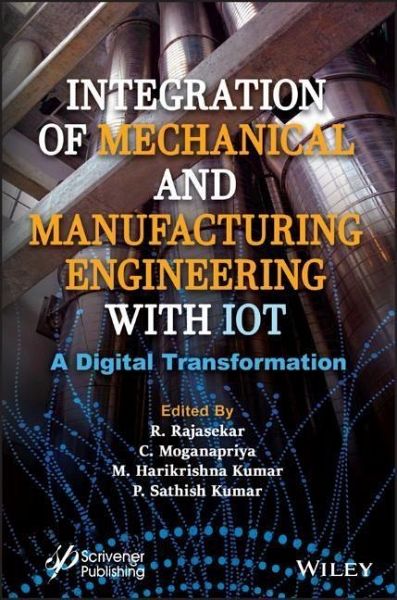
Integration of Mechanical and Manufacturing Engineering with Iot
A Digital Transformation
Herausgegeben: Rajasekar, R.; Moganapriya, C.; Kumar, M. Harikrishna; Kumar, P. Sathish
Versandkostenfrei!
Versandfertig in über 4 Wochen
171,99 €
inkl. MwSt.
Weitere Ausgaben:

PAYBACK Punkte
86 °P sammeln!
INTEGRATION OF MECHANICAL AND MANUFACTURING ENGINEERING WITH IOTThe book provides researchers, professionals, and students with a resource on the basic principles of IoT and its applications, as well as a guide to practicing engineers who want to understand how the Internet of Things can be implemented for different fields of mechanical and manufacturing engineering.This book broadly explores the latest developments of IoT and its integration into mechanical and manufacturing engineering. It details the fundamental concepts and recent developments in IoT & Industry 4.0 with special emphasis on...
INTEGRATION OF MECHANICAL AND MANUFACTURING ENGINEERING WITH IOT
The book provides researchers, professionals, and students with a resource on the basic principles of IoT and its applications, as well as a guide to practicing engineers who want to understand how the Internet of Things can be implemented for different fields of mechanical and manufacturing engineering.
This book broadly explores the latest developments of IoT and its integration into mechanical and manufacturing engineering. It details the fundamental concepts and recent developments in IoT & Industry 4.0 with special emphasis on the mechanical engineering platform for such issues as product development and manufacturing, environmental monitoring, automotive applications, energy management, and renewable energy sectors. Topics and related concepts are portrayed comprehensively so that readers can develop expertise and knowledge in the field of IoT. It is packed with reference tables and schematic diagrams for the most commonly used processes and techniques, thereby providing a resource on the basic principles and application of IoT in manufacturing sectors.
Audience
The book will be read by academic researchers, industry engineers, and R&D personnel in materials, information and technology, artificial intelligence, and manufacturing. The book will greatly assist graduate students.
The book provides researchers, professionals, and students with a resource on the basic principles of IoT and its applications, as well as a guide to practicing engineers who want to understand how the Internet of Things can be implemented for different fields of mechanical and manufacturing engineering.
This book broadly explores the latest developments of IoT and its integration into mechanical and manufacturing engineering. It details the fundamental concepts and recent developments in IoT & Industry 4.0 with special emphasis on the mechanical engineering platform for such issues as product development and manufacturing, environmental monitoring, automotive applications, energy management, and renewable energy sectors. Topics and related concepts are portrayed comprehensively so that readers can develop expertise and knowledge in the field of IoT. It is packed with reference tables and schematic diagrams for the most commonly used processes and techniques, thereby providing a resource on the basic principles and application of IoT in manufacturing sectors.
Audience
The book will be read by academic researchers, industry engineers, and R&D personnel in materials, information and technology, artificial intelligence, and manufacturing. The book will greatly assist graduate students.



